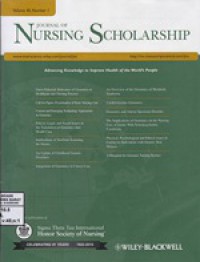
Jurnal
Job-Related Stress, Emotional Labor, and Depressive Symptoms Among Korean Nurses
Purpose: The purpose was to examine the relationship between job-related stress, emotional labor, and depressive symptoms among South Korean nurses in order to suggest practical methods for their management, prevention, and reduction. Design: A cross-sectional, descriptive study design was used to conduct the study. A convenience sample of 441 nurses who were employed in five general hospitals in four provinces of Korea was used in the study. Methods: A self-reported questionnaire was used to collect data, which included demographic and job characteristics, job-related stress, emotional labor, and depressive symptoms. Data were analyzed using descriptive statistics, chi-squared testing, and multivariate logistic regression. Findings: Approximately 38% of South Korean nurses experience depressive symptoms, and young or single nurses in particular have high levels of depressive symptoms. Marital status (odds ratio [OR] = 2.88), surface acting (OR = 2.46), job insecurity (OR = 1.99), and lack of reward (OR = 1.60) are strongly related depressive symptoms that result from job-related stress. Conclusions: Findings indicate that programs for nurses need to be created that will help reduce expectations for surface acting and control job-related stress, thus preventing the development of depressive symptoms. Clinical Relevance: This study has implications for human resources management in nursing organizations. If nursing administrators understand that nurses may suffer from depressive symptoms, they can strive to improve stressful work conditions, develop programs that ease job-related stress, and reduce the chances that depressive symptoms will occur.
Availability
No copy data
Detail Information
- Series Title
-
Journal of Nursing Scholarship, Volume 45, Number 2 2013
- Call Number
-
(05) 610.5 WIL j
- Publisher
- Malden : Wiley-Blackwell., 2013
- Collation
-
Hlm. 169-176
- Language
-
English
- ISBN/ISSN
-
1527-6546
- Classification
-
(05) 610.5 WIL j
- Content Type
-
-
- Media Type
-
-
- Carrier Type
-
-
- Edition
-
Volume 45, Number 2
- Subject(s)
- Specific Detail Info
-
-
- Statement of Responsibility
-
-
Other version/related
No other version available
File Attachment
Comments
You must be logged in to post a comment
 Computer Science, Information & General Works
Computer Science, Information & General Works  Philosophy & Psychology
Philosophy & Psychology  Religion
Religion  Social Sciences
Social Sciences  Language
Language  Pure Science
Pure Science  Applied Sciences
Applied Sciences  Art & Recreation
Art & Recreation  Literature
Literature  History & Geography
History & Geography